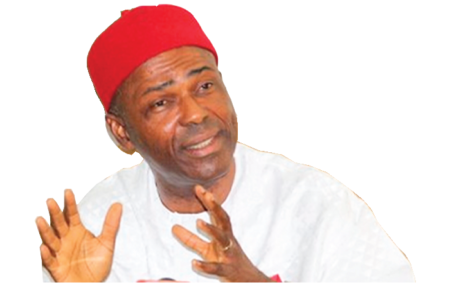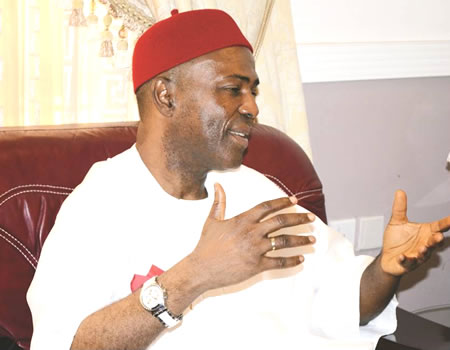
Dr Ogbonnaya Onu, the Minister of Science and Technology is a Fellow of the Nigerian Society of Chemical Engineers and the Nigerian Society of Engineers. He speaks with ADEMOLA ADEGBITE, on his efforts to ensure that science and technology leads the way in the nation’s economic recovery programme, and how Nigerians are gradually embracing science and technology, among other issues.
What challenges did you encounter as a Minister in the Ministry of Science and Technology and what did you do to surmount the hurdles?
The major challenge could be said to be a situation where our nation has not fully appreciated the importance of Science, Technology and Innovation to nation-building. We had relied so much on commoditie such as cocoa, palm oil, groundnut and so on and later, crude oil to natural gas which gave us a sense of security, so whenever there is a sharp drop in the prices of these commodities, our economy is badly affected, sometimes leading to recession. So, for me, the greatest challenge was how to redirect the thinking of the people to attach importance to science and technology. And we have been able to surmount the hurdles by advocating, in so many ways, the need for Nigeria to embrace science and technology and we have reached out to young ones and government at all levels to appreciate the roles of science and technology.
Our research institutes are bringing new products into the market and we are succeeding as the level of innovation has increased considerably. The most important thing is that no nation in the world has ever been great without science and technology. So, Nigeria cannot be an exception. With greater emphasis now laid on science and technology, we will now be in a position to diversify. What do I mean by diversify? We will now be able to feed ourselves. We will produce all those food items that we usually import and it is science and technology that will help us to achieve this.
The first thing that we are trying to do is to even make Nigerians recognise the importance of science and technology in nation building. We even think that it is the most important thing because living revolves around science and technology and we must exploit it to make our people experience good living. Science and technology is omnipresent. It is in every sector, whether it is in agriculture, environment, defence, crowd control, health and others. There is no sector that science and technology does not influence. Science and technology is the process of positive change, geared towards improvement of the system. Already, I have asked all the agencies under this ministry to concentrate on one or two areas of their mandates, so that we can easily measure progress. Once they make any finding, we want them to protect the intellectual property. They should go and patent them. And it is happening. Some of our agencies had written to me that they have started patenting their products. If it were before, they would just let it lie there, gathering dust. When you patent, you protect that intellectual property and investors can come to you.
In 2015 for instance, National Office for Technology Acquisition and Promotion (NOTAP) had just six patents, a year after I assumed office, the patents rose to 16, in 2017 it rose to 50 patents, more than triple. This shows us the level of innovation, inventiveness and creativity since we came on board. NOTAP is set up to encourage research institutes, to protect their intellectual property. We are on the path of sustainable economic recovery. The good thing is that we are moving in a different direction. If we try to move in the same direction with the successive administrations, recovery will be far more difficult and it won’t get us to where we should be.
What are your major achievements in the past two years in this ministry?
For me, what excites the most is the renewed awareness on science and technology. That consciousness is very important because no nation ever becomes great without science and technology. Our new Economic Recovery and Growth Plan (ERGP) has placed science and technology at the centre of all economic activities, so we are redirecting our research findings to be converted into products through commercialization. We want all good ideas and all research findings to be commercialized, so that you can now take an idea, which might not be invisible, and then transform it to something that is visible, in form of a product or a service. And we are getting results. Like High Nutrient Biscuit from the Federal Institute of Industrial Research, Oshodi (FIIRO) which is being taken to NASCO in Jos. We are also producing football and sports kits of high standard for use by our populace and kids.
I just received good news now, which is another major milestone. The Presidential Executive Order 5, which has now been gazetted. This will help us in producing many of the things we import into this country, create jobs, fight excruciating poverty and help grow our economy. We had a sad situation where we virtually depended on money from crude oil, even to import food. We are importing rice. We are importing sugar, wheat, even corn. We are importing virtually everything into this country. I am talking about food! I am not even talking about equipment, machines and all that. It is because we have this administration that has tried to block all leakages; otherwise, the effects would have been very severe. Do we remain a consumer nation forever? No! We must start producing. Science and technology is vital and China has shown it. It is very clear. Japan did it before. And President Muhammadu Buhari is committed to diversifying the economy.
What should Nigerians expect from this ministry in less than one year to the 2019 general elections?
To get more Nigerians to know the importance of science and technology, a nation, we need to make sure that we utilise all the resources that we have for the advancement of our national interest. And the process has started.
WATCH TOP VIDEOS FROM NIGERIAN TRIBUNE TV
- Let’s Talk About SELF-AWARENESS
- Is Your Confidence Mistaken for Pride? Let’s talk about it
- Is Etiquette About Perfection…Or Just Not Being Rude?
- Top Psychologist Reveal 3 Signs You’re Struggling With Imposter Syndrome
- Do You Pick Up Work-Related Calls at Midnight or Never? Let’s Talk About Boundaries






